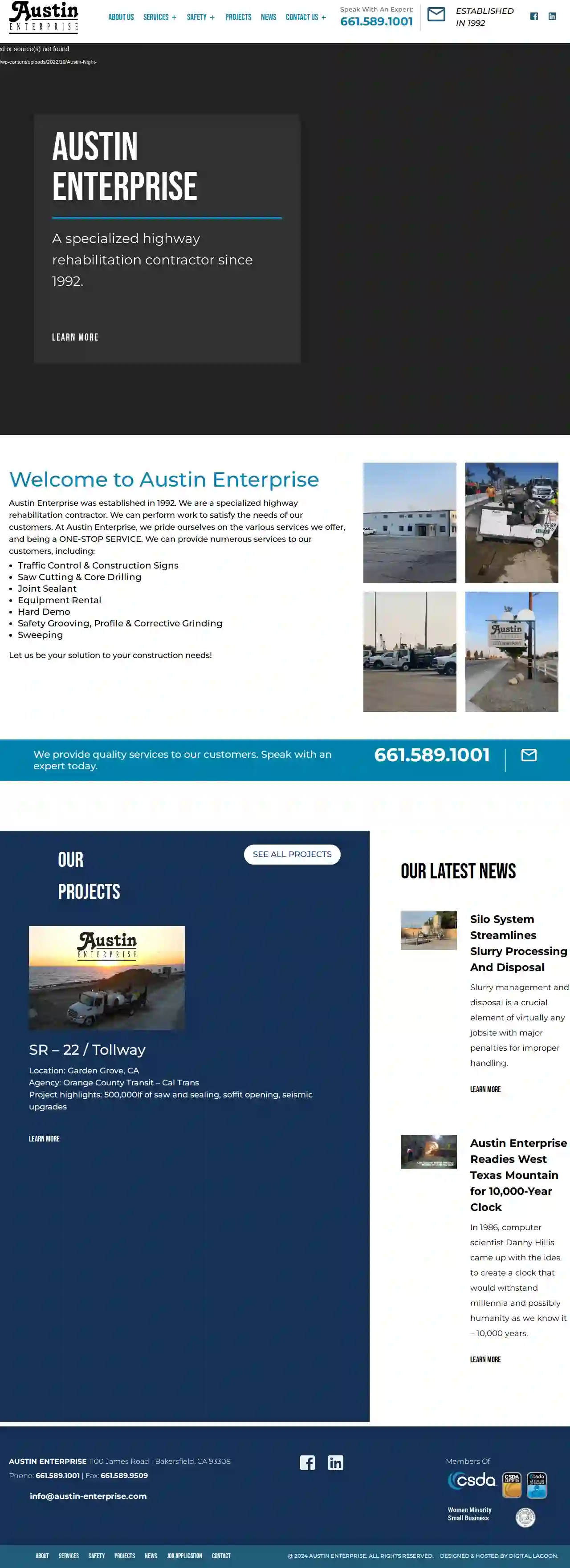Demolition Contractors Concord
Top Building Demolition in Concord
Get up to 3 Demolition Contractor quotes for your project today! Compare profiles, reviews, accreditations, portfolio, etc... and choose the best service.

Double Edge Construction Inc
1Irvine, USProfessional Construction Service At Double Edge Construction Inc., we are your trusted partner for high-quality construction and remodeling services in Orange County and the surrounding areas. Our expertise spans a wide range of services, including bathroom remodeling, kitchen remodeling, deck construction, foundation repair, and new building construction. We also specialize in water heater installation, seismic retrofitting, outdoor structure construction, and more. Our team of experienced professionals is dedicated to delivering top-notch craftsmanship and ensuring your complete satisfaction. Whether you’re looking to remodel your bathroom or kitchen, build a new deck, or undertake a full-scale construction project, we manage every aspect with precision and care. We take pride in our ability to bring your vision to life, from the initial design to the final touches. Double Edge Construction Inc. proudly serves communities throughout Orange County, including Tustin, Santa Ana, Orange, Irvine, Newport Beach, Laguna Beach, Costa Mesa, Anaheim, Fullerton, Mission Viejo, and beyond. Our local knowledge and commitment to excellence make us the ideal choice for homeowners and businesses in these areas. For reliable and professional construction and remodeling services, contact Double Edge Construction Inc. today. Let us help you turn your project into a reality with our seamless, hassle-free approach. Our Services Construction, Installations & Repairs
- Services
- Why Us?
- Testimonials
- Gallery
Get Quote
Souza Construction & Electric
52 reviews586 So. Farmersville Blvd., Farmersville, 93223, USSouza Construction Inc. is a growing construction business, striving ever forward to become a premier general contractor. From our beginning as a “one-man show”, until our present state as a “multi-faceted” team, one thing has remained constant, a commitment to customer service. It is this commitment that has helped Souza Construction Inc. nearly double its sales every year for the last four years. We firmly believe that it will be this continuing commitment that will assist us in continuing this phenomenal growth pattern. Essential to this excellent service are our capabilities as a builder and a business. THE SOUZA COMMITMENT Souza Construction Inc. has committed itself to recruiting and training leaders in both the construction and professional world. Assembling a team of this caliber is not a quick or simple process, but requires diligent research, highly refined discernment, and continuous assessment. However, it is just this level of commitment and attention to detail that sets us apart. Souza Construction Inc. has made this our primary goal: understanding our customers and their needs, utilizing excellence in the field and in administration, and combining this with an unwavering commitment to customer satisfaction; this is Souza Construction Inc.
- Services
- Why Us?
- Testimonials
- Gallery
Get Quote
Excavating Contractor Los Angeles
59 reviewsLos Angeles, USWelcome to Bobcat Excavating Services Los Angeles As an excavation services and bobcat services provider in Los Angeles, we at BSLA – Bobcat Services Los Angeles help our clients with any processes that involve removal of earth from the ground, transfer of earth from one site to another, backfilling of earth to previously excavated spaces, and modification of sites to suite various clients’ needs. Are you building or remodeling your outdoor space? Chances are that we can be of help. If you searched for “excavators near me” for you got to the right place! We are experts when it comes to excavation, bobcat services, compacting, filling and grading. We work on residential sites, commercial sites, and industrial locations. We are licensed and insured and all our machine operators are vigorously skilled in handling our heavy machinery and providing precision results.
- Services
- Why Us?
- Gallery
Get Quote- Ja
Jason Scott Grading & Clearing LLC.
51 reviewsDavis, US- Services
- Why Us?
- Gallery
Get Quote 
KR Land Development LLC: Land Clearing and Site Prep
516 reviewsOrange, USAbout KR Land Development At KR Land Development, our mission is to transform natural landscapes into safe, sustainable, and accessible spaces. With a deep respect for the environment and a commitment to efficiency, we provide expert land clearing services that pave the way for responsible land development. Our goal is to balance the needs of our clients with the preservation of nature, delivering innovative solutions that create a harmonious coexistence between humanity and the land. We are dedicated to improving the accessibility, safety, and utility of our clients’ properties while minimizing our impact on the environment. By aligning cutting-edge technology with eco-conscious practices, we aim to be leaders in the industry, leaving a legacy of well-cleared land and a healthier planet for future generations. Ready to Get Started On Your Land Clearing Project? We've Got You Covered! If you are looking to get started on your next land clearing project, we are here to help! KR Land Development offers free consultations to every client that is interested in our land clearing or property services. We are licensed & insured, protecting our clients and their property at all times throughout the land clearing process.
- Services
- Why Us?
- Gallery
Get Quote
A-1 Septic Services
4.675 reviewsModesto, USThe Best Value in Septic Tank Services in Merced County, Stanislaus County, and San Joaquin County Since 1990 The Best Value in Grading & Excavating in Merced County, Stanislaus County, and San Joaquin County Since 1990 Best Choice for Portable Restroom Rentals in Merced County, Stanislaus County, & San Joaquin County Expert Septic Tank Services, Grading & Excavating in Modesto, Oakdale, Escalon & Surrounding Areas For the best septic tank installation and repair, septic tank pumping, utility trenching, and grading/excavation services in Merced County, Stanislaus County, and San Joaquin County, choose A-1 Septic and AAA Backhoe Service. For over 30 years, we've been the preferred septic tank company and excavator for thousands of general contractors, builders, commercial businesses, property managers, city agencies, homeowners, and real estate agents. They trust us because we consistently deliver high quality workmanship and personalized customer service at very competitive prices. Whether you need septic tank repair in Modesto, leach line additions in Ceres, or utility trenching in Salida, we have the skills, knowledge, and expertise to get the job done according to the highest industry standards. AAA Backhoe Service holds a Class A General Engineering Contractors License from the California State License Board, and has earned an A+ rating with the Better Business Bureau. We always use the industry's best practices to ensure that all work gets completed on time, in budget, and in accordance with county and city building codes.
- Services
- Why Us?
- Accreditations
- Testimonials
- Gallery
Get Quote
Burchett Grading, Inc.
4.47 reviewsPo Box 892863, Temecula, 92589, USABOUT US Burchett Grading, Inc. is a full service grading and excavation company that has been in business for almost 50 years. President, Craig Burchett is a third generation heavy equipment operator. Coming from a family of farmers, the family business was started by his father, Gene Burchett back in the 1970's and he was known in the industry as one of the best operators around. Starting mainly as an AG prep contractor, most of the avocado groves were prepped by Gene, as he was one of the only graders in town that would clear and prep the steepest hills. Beyond that, Gene was a mainstay hired heavy equipment operator contracted with Cal-Fire and shifted his focused on residential house pads. Craig followed in his dad's footsteps and quickly developed his father's keen eye for dirt. In the recent years, BGI expanded it's services to more than just grading, but undertaking the entirety of civil plans and offering more diverse services such as storm drain and wet/dry utilities. Craig brings his extensive knowledge, experience, integrity and passion for dirt work that leaves nothing less than exceptional results. Our priority is to oversee your project, big or small, from start to finish, and to ensure that everything goes smoothly and is done right the first time. Our mission is to exceed your expectations. We would love the opportunity to work with you and look forward to hearing from you! OUR MISSION We know how challenging and daunting construction projects can be. This is why it is crucial to have the right contractor that can help face these challenges and give you the results you need. We are committed to excellence and the job at hand is always our top priority. We believe integrity, knowledge and extensive experience is the driving force of a successful construction project and we strive to attain nothing less. Whatever your vision may be, we are here to ensure your vision is carried out.
- Services
- Why Us?
- Gallery
Get Quote
Lend A Hand L.L.C
1123 Main Street, Anytown, 12345, USLend a Hand LLC Your Trusted Partner for Home Care At Lend a Hand LLC, we understand the importance of providing compassionate and reliable home care services. Our team of experienced and dedicated caregivers is committed to helping individuals maintain their independence and quality of life in the comfort of their own homes. We offer a wide range of services tailored to meet the unique needs of each client, including: Learn More
- Services
- Why Us?
Get Quote
Optimal EarthWork
51 reviews3070 Garden Ave, San Jose, 95111, USTransforming Landscapes with Precision: Earthworks Experts We harness the raw potential of the earth to create extraordinary transformations and deliver awe-inspiring results for every project we undertake. Excavation & Grading Swimming Pool Demolition Demolition
- Services
- Why Us?
- Accreditations
- Our Team
- Testimonials
- Gallery
Get Quote
Austin Enterprise
4.116 reviews1100 James Road, Bakersfield, 93308, USAbout Austin Enterprise For almost 30 years, Austin Enterprise has taken pride in having the best equipment and the best people to get any job done well and on-time. We employ 50+ employees and maintain a truck fleet of 40+ vehicles, ensuring that our customers can rest assured that they are getting quality work with the knowledge and experience of our teams to back it up. We’re proud to have been a CSDA member since 2010. Our mission is to be a professional specialty company. We take pride in ourselves, our company, equipment, and fellow employees. We strive to service our customers with quality service, provide well-trained employees, and maintain good working equipment. We aim to be the best in the industry, exceeding expectations and setting the standard for excellence. Patti Austin, the founder of Austin Enterprise, started the company in 1992 in Bakersfield, CA. Initially, Austin Enterprise focused on traffic control, providing highway construction signs. This early work allowed Patti to connect with other contractors working on highway projects. Through this networking, Patti identified opportunities to expand Austin Enterprise and added sawing and drilling to their list of services. Today, thanks to Patti’s dedication and hard work, Austin Enterprise has grown into one of the largest specialized highway rehabilitation contractors in California, with 47 trucks and over 50 employees. Austin Enterprise is a woman-owned business.
- Services
- Why Us?
- Our Team
- Gallery
Get Quote
Over 3,943+ Excavation Pros in our network
Our excavation pros operate in Concord and surrounding areas!
ExcavationHQ has curated and vetted the Best Excavation Contractors in Concord. Find a top & trustworthy contractor today.
Frequently Asked Questions About Demolition Contractors
- 'Can I see proof of your licensing and insurance?' Verify their credentials and coverage.
- 'What experience do you have with projects like mine?' Ensure they have relevant expertise.
- 'Can you provide references from past clients?' Check their reputation and customer satisfaction.
- 'What are your safety protocols?' Prioritize contractors who emphasize safety.
- 'How will you handle hazardous materials?' Ensure they have proper procedures for asbestos or lead abatement.
- 'What is your timeline for completing the project?' Understand the project duration.
- 'How will you manage noise, dust, and debris?' Discuss mitigation measures for minimizing disruption.
- 'What are your payment terms?' Clarify payment schedules and any required deposits.
- Size and Complexity of the Structure: Larger and more complex structures, such as multi-story buildings, require more time, labor, and specialized equipment, increasing costs.
- Type of Demolition: Different demolition methods, such as implosion, wrecking ball, or high-reach demolition, have varying costs.
- Material Disposal: Disposal fees for demolition debris can contribute significantly to the overall cost, depending on the type and quantity of materials.
- Location and Accessibility: Demolition in densely populated areas or with limited access may require more planning and specialized equipment, affecting costs.
- Hazardous Materials: The presence of asbestos, lead paint, or other hazardous materials requires specialized removal and disposal procedures, adding to the expenses.
- General Liability Insurance: Covers bodily injury or property damage to third parties caused by the contractor's negligence.
- Workers' Compensation Insurance: Provides benefits to workers injured on the job.
- Pollution Liability Insurance: Covers costs associated with environmental contamination caused by demolition activities.
- Professional Liability Insurance: Protects against claims of negligence or errors in professional services, such as demolition planning or consulting.
What questions should I ask a demolition contractor before hiring them?
How much does demolition cost in the USA?
What is the importance of insurance in demolition projects?
Do I need a permit for demolition?
What questions should I ask a demolition contractor before hiring them?
- 'Can I see proof of your licensing and insurance?' Verify their credentials and coverage.
- 'What experience do you have with projects like mine?' Ensure they have relevant expertise.
- 'Can you provide references from past clients?' Check their reputation and customer satisfaction.
- 'What are your safety protocols?' Prioritize contractors who emphasize safety.
- 'How will you handle hazardous materials?' Ensure they have proper procedures for asbestos or lead abatement.
- 'What is your timeline for completing the project?' Understand the project duration.
- 'How will you manage noise, dust, and debris?' Discuss mitigation measures for minimizing disruption.
- 'What are your payment terms?' Clarify payment schedules and any required deposits.
How much does demolition cost in the USA?
- Size and Complexity of the Structure: Larger and more complex structures, such as multi-story buildings, require more time, labor, and specialized equipment, increasing costs.
- Type of Demolition: Different demolition methods, such as implosion, wrecking ball, or high-reach demolition, have varying costs.
- Material Disposal: Disposal fees for demolition debris can contribute significantly to the overall cost, depending on the type and quantity of materials.
- Location and Accessibility: Demolition in densely populated areas or with limited access may require more planning and specialized equipment, affecting costs.
- Hazardous Materials: The presence of asbestos, lead paint, or other hazardous materials requires specialized removal and disposal procedures, adding to the expenses.
What is the importance of insurance in demolition projects?
- General Liability Insurance: Covers bodily injury or property damage to third parties caused by the contractor's negligence.
- Workers' Compensation Insurance: Provides benefits to workers injured on the job.
- Pollution Liability Insurance: Covers costs associated with environmental contamination caused by demolition activities.
- Professional Liability Insurance: Protects against claims of negligence or errors in professional services, such as demolition planning or consulting.